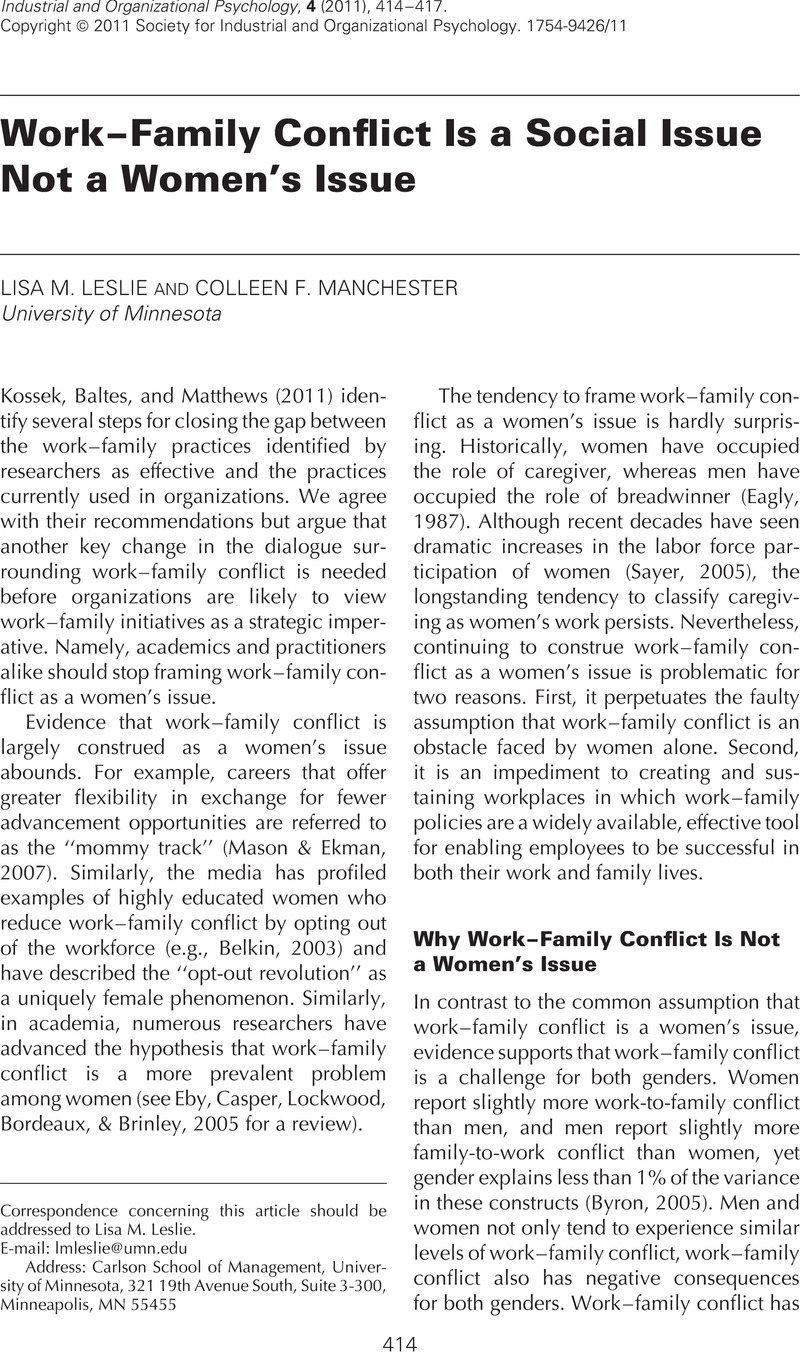Crossref Citations
This article has been cited by the following publications. This list is generated based on data provided by Crossref.
Kossek, Ellen Ernst
Baltes, Boris B.
and
Matthews, Russell A.
2011.
Innovative Ideas on How Work–Family Research Can Have More Impact.
Industrial and Organizational Psychology,
Vol. 4,
Issue. 3,
p.
426.
Manchester, Colleen Flaherty
Leslie, Lisa M.
and
Kramer, Amit
2013.
Is the Clock Still Ticking? An Evaluation of the Consequences of Stopping the Tenure Clock.
ILR Review,
Vol. 66,
Issue. 1,
p.
3.
Wilhoit, Elizabeth D.
2014.
Opting Out (Without Kids): Understanding Non‐Mothers' Workplace Exit in Popular Autobiographies.
Gender, Work & Organization,
Vol. 21,
Issue. 3,
p.
260.
Herbers, Joan M.
2014.
Part‐Time on the Tenure Track.
ASHE Higher Education Report,
Vol. 40,
Issue. 5,
p.
1.
Reid, Erin
2015.
Embracing, Passing, Revealing, and the Ideal Worker Image: How People Navigate Expected and Experienced Professional Identities.
Organization Science,
Vol. 26,
Issue. 4,
p.
997.
Tower, Leslie E.
Faul, Anna
Hamilton-Mason, Johnnie
Collins, Wanda Lott
and
Gibson, Priscilla
2015.
Work/Life Fit.
Affilia,
Vol. 30,
Issue. 4,
p.
519.
Gabaldon, Patricia
de Anca, Celia
Mateos de Cabo, Ruth
and
Gimeno, Ricardo
2016.
Searching for Women on Boards: An Analysis from the Supply and Demand Perspective.
Corporate Governance: An International Review,
Vol. 24,
Issue. 3,
p.
371.
Shockley, Kristen M.
Smith, Christine R.
and
Knudsen, Eric A.
2017.
The Wiley Blackwell Handbook of the Psychology of Recruitment, Selection and Employee Retention.
p.
513.
de Anca, Celia
and
Aragón, Salvador
2018.
Spanish women’s career inhibitors: 2007-2017.
Academia Revista Latinoamericana de Administración,
Vol. 31,
Issue. 1,
p.
73.
Ryan, Ann Marie
and
Briggs, Caitlin Q.
2019.
Improving work-life policy and practice with an intersectionality lens.
Equality, Diversity and Inclusion: An International Journal,
Vol. 39,
Issue. 5,
p.
533.
Wood, Stephen
Daniels, Kevin
and
Ogbonnaya, Chidiebere
2020.
Use of work–nonwork supports and employee well-being: the mediating roles of job demands, job control, supportive management and work–nonwork conflict.
The International Journal of Human Resource Management,
Vol. 31,
Issue. 14,
p.
1793.
Straub, Caroline
Vinkenburg, Claartje J.
and
van Kleef, Marco
2020.
Career customization: Putting an organizational practice to facilitate sustainable careers to the test.
Journal of Vocational Behavior,
Vol. 117,
Issue. ,
p.
103320.
Ng, Matthew A.
Naranjo, Anthony
Schlotzhauer, Ann E.
Shoss, Mindy K.
Kartvelishvili, Nika
Bartek, Matthew
Ingraham, Kenneth
Rodriguez, Alexis
Schneider, Sara Kira
Silverlieb-Seltzer, Lauren
and
Silva, Carolina
2021.
Has the COVID-19 Pandemic Accelerated the Future of Work or Changed Its Course? Implications for Research and Practice.
International Journal of Environmental Research and Public Health,
Vol. 18,
Issue. 19,
p.
10199.
Moors, Amy
Stewart, Abigail
and
Malley, Janet
2022.
Managing the career effects of discrimination and motherhood: The role of collegial support for a caregiving policy at a research-intensive U.S. university.
Journal of Higher Education Policy and Management,
Vol. 44,
Issue. 4,
p.
377.
Churchill, Brendan
and
Craig, Lyn
2022.
Men’s and women’s changing attitudes towards fatherhood and working fathers in Australia.
Current Sociology,
Vol. 70,
Issue. 6,
p.
943.
Zhang, Mian
Dou, Jifang
Foley, Sharon
Shaffer, Margaret
and
Li, Quan
2022.
The relationship between gender and work-to-family conflict among Chinese managers: testing a moderated mediation model.
The International Journal of Human Resource Management,
Vol. 33,
Issue. 12,
p.
2541.





